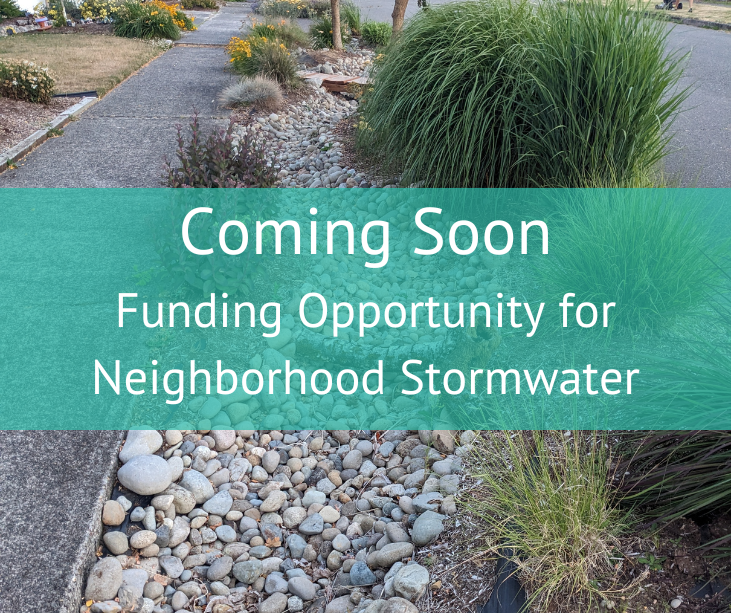The Stormwater Strategic Initiative will open a new Request for Proposals (RFP) on May 7, with $1 million available for Neighborhood Stormwater Education and Assistance projects.
More...
This RFP supports Freshwater (BIBI) Priority C from the 2024 Investment Plan, covering planning, implementation, and maintenance of stormwater projects in local neighborhoods in Puget Sound.
The application period will be open from May 7 through July 9, 2025. If you are considering an application, please submit this short “Interest in Applying” form as soon as possible to help us connect you with resources to develop a strong application! We will also offer webinars and office hours for applicants to ask questions and receive feedback on conceptual project ideas during the application period.
The full solicitations and application details for the following RFP will be available on the Stormwater SIL’s RFP page on May 7, 2025. The investment priority description is below:
BIBI (Freshwater Quality) Priority C – Neighborhood Stormwater Education and Assistance ($1 million available)
Many of Puget Sound’s residents live in neighborhoods where the only stormwater infrastructure is on private property or in private shared systems. Maintaining these systems offers people meaningful opportunities to contribute to the health of their local waters and fish populations but requires training and programmatic support for long-term sustainability. This investment supports education and assistance programs to encourage implementation and maintenance of stormwater best management practices in local neighborhoods. Funded activities should improve stormwater compliance on private land by using multiple avenues to educate property owners, residents, homeowner associations, and developers about green stormwater infrastructure and stormwater maintenance responsibilities, as well as providing technical and/or financial assistance for implementation. To support lasting impact, projects should include monitoring to document water quality and environmental benefits, and may include strategies such as governance, funding and stewardship plans to secure the long-term performance of privately built stormwater infrastructure. This investment is funded as the top recommendation from the Land Use Compliance and Incentives Workshop held by the Stormwater SIL in fall 2023.
Projects may include:
- Developing tools, resources, or programs to educate landowners and influencers (real estate agents, Homeowners Associations (HOAs), land use consultants, contractors, and others) about stormwater practices;
- Providing technical assistance such as pre-application and compliance support and incentives for landowners, developers, and residents to implement and maintain green stormwater infrastructure;
- Community outreach events, such as restoration plantings or Low Impact Design (LID)/Green Stormwater Infrastructure (GSI) educational seminars and trainings;
- Developing long-term plans, agreements, and funding mechanisms for developing and maintaining stormwater infrastructure within local individual catchments (including systems owned by HOAs); or
- GSI training and/or certification programs aligned with community affordable housing, workforce development, and environmental justice goals.
Start brainstorming ideas now
We want to know who may be interested in applying for grant funds under this solicitation so that we can better provide grant assistance during the application period. Please complete the Interest in Applying form as early as possible so we can assist you. The Stormwater SIL team will host online office hours to answer applicant questions and help you prepare the best proposal possible. We encourage first-time and returning applicants to join office hours (dates coming soon) or contact Chanele Holbrook (chanele.holbrook@ecy.wa.gov) with questions.
Did you know?
This opportunity is funded by the EPA Puget Sound Recovery National Program Office. The Stormwater SIL’s Puget Sound Geographic Funds through EPA are intended to support creative and catalytic projects that may be challenging to fund through other sources, but have the potential for transformative impact on water quality or stormwater management, either within a specific local community or at the regional level.

